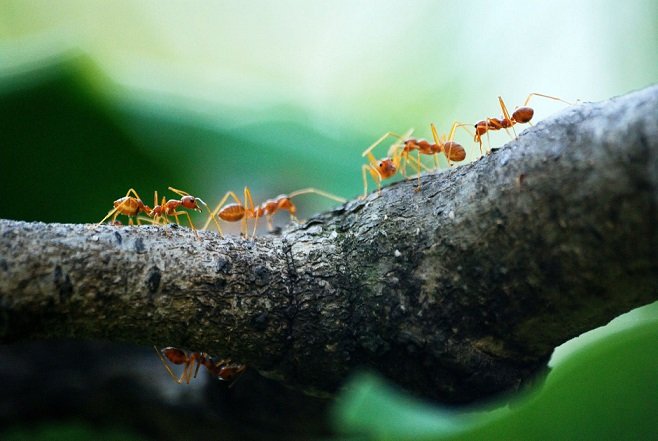Ants are a common garden pest that lemon tree growers will probably have to deal with at some point or another. Although ants are an important part of the ecosystem, ants’ presence could spell disaster for your lemon tree.
Aphids are what draw ants to lemon trees. If your lemon tree has aphids, there are high chances ants will pursue it! Constant attack by aphids and ants will cause a lemon tree to show defective and stunted growth.
You can get rid of ants on the lemon tree by spraying with water, using essential oils, pest deterring companion plants, talcum or baby powder, or chalk.
Why Are Ants Attracted to Lemon Trees?
Whenever you see a swarm of ants heading up a plant or fruiting tree, you assume it is for the flowers, fruit, or water. However, this is not true at all! We rarely take time to think that another live organism is attracting them.
In fact, ants are attracted to lemon trees for aphids. These insects are actually a source of nutrition for the ants. Aphids create honeydew, a substance high in sugar and highly useful to ants.
Ants will tend to protect the aphids to assure their food supply, this even means protecting the aphids!
As a result, you will have to get rid of one to get rid of the other. To understand this better, let’s take a look at why aphids have an affinity for lemon trees.
Why Are Aphids Attracted to Lemon Trees?
Aphids are tiny insects that feed on the cell sap of plants. You will find them around the stems and on leaves. Leaves are where they gather and feed. They use their sharp mouthparts to pierce the leaves and feed off phloem.
But, while feeding on the leaves, the excess sugars are released in the form of honeydew. This substance is highly nutritious to ants who are eager to feed on it. In turn, the ants will even rear the aphids to guarantee a steady flow of honeydew.
What happens to lemon trees in winter? Read about it in Can lemon trees survive winter? How much cold can it survive?
What Are the Methods of Getting Rid of Ants on Lemon Trees?
Hate insecticides and want cleaner and safer alternatives to get rid of ants on your lemon tree? There are in fact many ways to go about it other than using deadly chemicals. Here are a few ways to get rid of ants on lemon trees.
#1- Get Rid of Aphids!
We have established that ants are attracted to trees that house aphids. So, getting rid of the aphids should help to remove the ants.
The aphids act as a source of food for the ants. Remove this food source and the ants will have no business poking around your lemon tree.
Here are a few tips to control aphids:
- Try to keep away from insecticides. They may harm the beneficial insects that help in pollination.
- Invite pests predators like lace wigs and lady beetles that naturally feed on aphids.
- Spraying regularly with water under high pressure would do wonders to inhibit aphid infestations from the start.
- Manage and control aphid populations by inspecting your lemon trees regularly. Small aphids are easier to control and are likely to not attract ants.
- For smaller lemon trees you can use insecticidal soap or spray (solution). You can also wipe the lemon tree with Neem oil.
#2- Spraying With Water
This method works for dispelling aphids as well as ants. Using a high-pressurized hose pipe, you can spray the insects away. This is not so bad seeing as it is just water and not a chemical that has lasting effects on plants and insects.
This high-pressure water will remove the majority of the swarm but you should expect the odd few to remain behind. Additional sessions of water spraying for consecutive days will manage to get the majority of the ants off of your lemon trees.
After a few days, they can be completely removed if what they want has been completely gotten rid of.
#3- Application of Essential Oils on Stems
Essential oils are the natural choice as a deterrent for more than just ants. This comes as no surprise because of the strong scents these substances carry.
Ants dislike these potent aromas as they interfere with their pheromones. Thus, they would not be able to lead swarms of ants around your lemon tree if it has essential oils around it.
You can use it as an oil or you can make a solution and use it as a spray. The best part about these oils is that they can be used anywhere on your lemon tree.
It generally stays better than other pest-deterrent materials.
#4- Plant Pest-Deterrent Companion Plants
If you are looking for a more natural way to get rid of ants, you can turn to plants that naturally deter ants. Some plants have a distinct smell that is too strong for the liking of ants.
These plants usually fall in the category of herbs and spices. Hence, you can place these plants around your lemon trees to keep away more than just ants. Also, lemon tree companion plants can offer more than just protection against pests.
If you want to know which plants are beneficial, here are the best lemon tree companion plants.
#5- Power the Trunk with Talcum/Baby Powder
Ants would rather stay away from a lemon tree than walk over a trunk that’s been applied with talcum powder. The reason is that the ants don’t like the feel of the powder on their legs as they move.
Also, we think getting it off their body could prove to be a bit problematic! Furthermore, the powder works in a way to disrupt their pheromones and helps to deter them for a while. However, there are some drawbacks!
The powder will only deter ants and cannot completely get rid of them. Plus, it only keeps them for as long as it remains on the lemon tree! This means applying it several times. Also, you can only use it in summer as it gets washed off after rainfall.
#6- Draw a Line of Chalk
While this is only a temporary solution, it is an option in desperate cases at least before you find a better solution. Again chalk acts as a disturbance that actually makes ants confused and lose their way.
Again, this is because of the scents the chalk may let off. Although momentary drawing with chalk is a time-sensitive option that doesn’t cost much.
Plus it will probably be the best option for when there is just a small line of ants on your lemon tree.
Are Ants Bad For Lemon Trees?
Getting rid of the ants as soon as possible should be your main concern. The reason is simple. Ants are present because of aphids, where there are aphids your plant is being fed upon! So yes, ants are bad for lemon trees.
A very large swarm of aphids will affect your lemon trees.
Young leaves that are affected by aphids will soon start to exhibit distorted growth. This includes curled, folded, or rolled leaves. In turn, this affects the lemon tree’s ability to grow well and produce flowers and ultimately lemons as well.
Find out why your lemon tree isn’t producing lemons (with Solutions).
Conclusion
Ants are not a good sign on lemon trees. That’s because lemon trees that have ants also have aphids as well. Aphids feed on the cell sap of lemon trees and this will affect the growth and productivity of the lemon trees.
You can get rid of ants using the following methods:
- Spraying with water.
- Applying essential oil.
- Pest deterring companion plants.
- Use talcum powder or baby powder.
- Draw out a line using chalk.
The secret to actually getting rid of ants and doing it fast revolves around getting rid of aphids first! Try to get rid of the aphids and getting rid of the ants will be so much easier since they have no reason to be there anymore.
FAQs
You may seek neutral methods of removing ants from fruit trees if you don’t want to spend too much money on potentially harmful chemical insecticides. The best alternative would be to spray pressurized water, grow herbs/spices nearby, and apply essential oils to the lemon trees.
Ants are a sign of aphids. Wherever there are aphids, they are probably feeding on your lemon tree’s leaves. Constant feeding can take a toll on your lemon tree and it can suffer for it. Lemon trees affected by aphids and ants will look deformed and may not yield healthy lemons.


